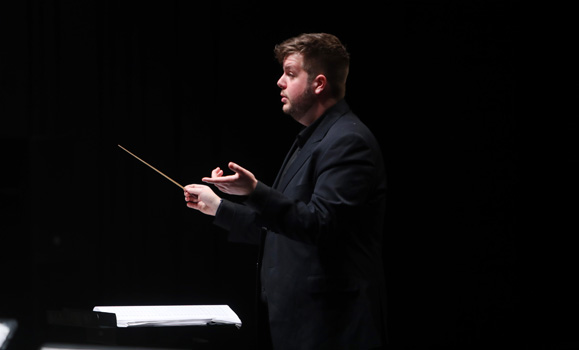“There’s going to be a trombone mouthpiece in your saxophone,” explained Jacob Caines “That’s our solution.”
The problem the director of the Dalhousie Wind Ensemble was in need of solving was how to create the guttural growl necessary to bring Inti Figgis-Vizueta’s New Cosmologies to life. The experimental soundscape is just one of many inventive and innovative pieces on the program of Litmus Blue, the ensemble’s co-production with Nova Scotia-based, artist-led ensemble, Alkali Collective.
Caines is chiefly responsible for the collaboration between the Fountain School of Performing Arts’s Wind Ensemble and Alkali Collective. As Alkali’s clarinetist for the past three years, he knew that his vision for the Wind Ensemble’s concert aligned perfectly with Alkali’s mission. The independent ensemble prides itself on an interdisciplinary approach to art, grounded in music concerning contemporary social issues.
“I really believe in the importance of commissioning, programming, and performing [the work of] marginalized composers,” Caines says. As such, the program for Litmus Blue showcases works composed by women, BIPOC, and LGBTQ+ composers. This includes composers such as Missy Mazzoli, Bekah Simms, and the Fountain School’s own Amy Brandon.
Litmus Blue takes place Saturday, March 25 at the Joseph Strug Concert Hall in the Dalhousie Arts Centre at 7:30 p.m.
[Reserve tickets to Litmus Blue]
Challenging the audience
Caines acknowledges that the music the ensemble is performing in the show might be strange to some. The use of graphic scores, timed pieces, and lengthy spoken word passages challenges preconceptions of what a wind ensemble should sound like.
Wind ensembles are born from the military marching band tradition. The practice based on regimented and time-tested repertoire, by and large, has seen little evolution in the 150 years since its inception.
Referring to the choice to break away from tradition and program more unique works, Caines says, “We are being a little more subversive by doing this … it is chaotic music and people who are not used to new music find it very overwhelming sometimes."
Connection through chaos
It is this commitment to chaos, and what Caines describes as a “necessary silliness,” that allows the ensemble to produce its best, most affecting work.
“I always program shows where I want someone to just feel something. Good, bad, positive, negative,” he says. “I always prefer an emotion over no emotion.”
“I would rather somebody be able to say, ‘wow that was very chaotic and I felt uncomfortable with it, and I didn’t know how to receive it, and I didn’t know when it was over, and I didn’t know when to clap, and I didn’t know what I was listening for,’ that’s great! That’s fine, that’s an okay thing to feel."

Jacob Caines.
The Wind Ensemble is ready and willing to lean into this feeling. There is a genuine excitement amongst the group at the prospect of swapping instruments with one another and experimenting with body percussion for the cacophonous ending of the aforementioned New Cosmologies, or playing with the dissonant trills of Bekah Simms’ Amok (as a syndrome) — which sound as though they’re pulled straight from the soundtrack of a horror film.
“[Litmus Blue] is really just a celebration of good music by people who don’t normally get programmed,” Caines says, hoping that the show will provide thought-provoking entertainment for audience members.
Tickets for Litmus Blue are available from the Dalhousie Arts Centre box office and online at dal.ca/artscentre.

